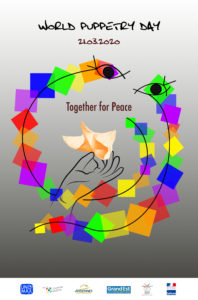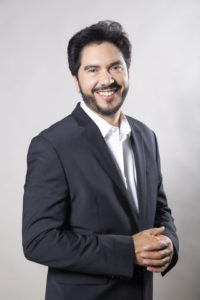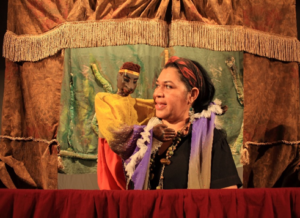Download the message
Awakening anew
By Manuel Antonio Morán, Ph.D.
Voice from North America
There is a new awakening in the Americas, and there is a loud cry for peace, freedom, justice and equality. Through protests, demonstrations and marches, Americans (those from North, Central, Caribbean and South America) continue to raise their voices and exercise their right to freedom of expression. We claim for peace, for our native indigenous communities, for the rights of women, girls and boys, for immigrants, for equity and diversity, for the environment, against poverty, for changing and overthrowing leaders and corrupt governments. The list is very long. Unfortunately, injustices drown us, and the time has come for people to unite and raise their voices.
Technology brings us closer, informs and, just as often, disinforms. It allows us to communicate instantly. The struggle is strengthened and the voices become even stronger with this new global resource.
Throughout history, puppet theater was a source of entertainment, but also an instrument for protest, to express social criticism against established powers, and denounce injustice. This holds true to this today. The contemporary puppet theater of the Americas has become a great and effective ally, and an incentive which enriches the struggle, amplifying the volume and voice of those claims. Through social networks and other publications on the Internet, we can see puppets are present in most of these manifestations and claims by the people.
Peace is a fundamental human right. Peace ensures, in a way, every other right. But in a special way, there is an intrinsic link between peace and freedom. The American activist, Malcolm X, stated “You cannot separate peace from freedom because no one can be at peace unless he has his freedom.” Freedom is that ideal state which we all have a right to, and it is what characterizes most of these struggles.
The great Mother Teresa of Calcutta said, “Peace begins with a smile.” Puppets are entities of peace because they evoke that feeling. Let us thank and celebrate puppets for helping us express our claims during the struggle, and for providing moments of tranquility, merriment and happiness that make us smile, which, in turn, is the principle of peace.
Today, on World Puppetry Day, let’s celebrate puppets and those who bring them to life, because they are our allies, in the search for a better world, for a better future.
Voices of America for peace
By Zoa Meza
Voice from Central America
Dear Puppeteers friends, partners and professionals of UNIMA, colleagues of the puppetry world, I have been proposed to write a message for the world puppetry day 2020, I feel excited and honored by the meaning of this privilege.
Dear friends, I am proud to belong to this community of Puppeteers and to live in Central America.
The problems of the region are not alien to us, as artists, we feel them in our skin and we are committed to that reality.
Our authors and their works speak, they link us to this universe, to their intimacy, they reveal to us their original contribution, enriching the history of our cultures.
We, the Puppeteers, are great architects of joy, renewed, even re-invented.
Nobody better than the puppets, brilliant builders of love and peace, intuit with masterful fantasy and imagination the transition from one historical moment to another. When we produce, we not only give life to the work, but also to the object, through which we communicate with society and build bridges to imagination and fantasy. This ephemeral fact stimulates the imaginary overflow of children, provokes the growth of people and the development of the community through this art.
In the commitment to educate, we puppeteers have our own place. Because we obey a platform to share and exchange creative ideas and knowledge, we not only enrich the cultural heritage of each nation and of all humanity, but we are servants of the common good. Our schools are also the squares and the roads, where we learn and teach with love, in order to conquer peace, with the art of animating objects.
As Central American puppeteers we are committed to stimulating new and future generations of young people in the art of puppetry, to sow the seeds of puppetry in the region, willing to promote the noblest values, such as tolerance, understanding and peace. The times we live in demands an enormous responsibility from us: to protect life and the planet.
As puppeteers of this Central America, our commitment is to strengthen our capacities, to be better manipulators, to nurture talent and to boldly tackle new issues.
Central America has lived through calamities, natural disasters, wars and social conflicts. The art for hope is part of an artistic proposal that allowed us to offer with our puppets and figures, hope to affected populations, victims of these events, this wonderful task of the puppet, that arises in the middle of hopelessness and pain, causing the laughter and the joy of life of our childhood, in the shelters and zones of conflict, as a vehicle that leads to harmony, to the protection of life, of memory, of cultural identity.
Let us therefore celebrate this love not only for puppet theatre, but for the love of humanity, for understanding between people regardless of their origin, cultural differences or religious and political convictions.
Let us celebrate together for Peace.
A major commitment
By Ruben Darío Salazar
Voice from the Caribbean
I was born and live on an island in the Caribbean Sea. It’s called Cuba. It is shaped like a crocodile, they say that from the sky it looks an intense green color. I don’t know any other name that makes my heart tremble as much as those four letters do. It’s not a perfect country. I know. What country can boast such a state of total correctness? We struggle every day to achieve it. As a puppeteer, I am proud to say that since 1959, from one end of this land to the other, the theatre has stood impatient and attended to in lively ways. We have formed a movement with all the aspirations and dreams of the collective where figures reign, a community that beyond differences defends alliances as a symbol of harmony and peace.
What do puppets talk about in our nation? What do the public find in the shows we propose? What do the spectators need? The questions come and go in the midst of the challenges facing the planet, that living sphere that spins in the middle of nowhere.
The first stories that were performed in the Cuban altarpieces, written by the director and playwright Modesto Centeno and the poet Nicolás Guillén, in the 1940s, were influenced by the classic stories (La caperucita roja) and raised, among other concerns, the issue of racism and social inequality (Poema con niños). From those candid stagings of the Republican era, made by the Camejo and Pepe Carril brothers, Dora Alonso, Beba Farías, Dora Carvajal, Nancy Delbert and María Antonia Fariñas, among other pioneers of the national puppetry art, the artistic creations have been changing in a hurry.
Between the 20th and 21st centuries, some works written on the island begin to speak only of climatic changes and ideological differences. The legends and fables of animals, kings, princes and princesses are ready to coexist with texts that reflect the upheavals of today’s society, alluding to the appearance of diseases and epidemics that are difficult to combat. The evils that made their appearance in the old stories of witches and sorcerers, including wars, are now a real threat, a nightmare that does not go away.
The abysmal use of artificial intelligence steals the brains and souls of our young and old. What should serve to conquer the light is bent on obscuring things, creating geopolitical tensions. Countries are divided. Areas of irreconcilable friends and enemies are established, all of them involved in a contest that seems to have no end.
The artists of the puppet theatre, in the midst of so much disaster, try, from our productions, to pronounce ourselves on what we are losing, the problems that drive us away instead of uniting us. And that cry, which has begun to spread universally, is not enough. There is more to it. There is much more urgency.
How can puppets, from their illusory, fragile, ephemeral cosmos, balance class differences, stimulate cultural values above the daily banality, avoid the useless deaths of thousands of children, women and the elderly, at the mercy of an economic and belligerent chaos that does not take them into account? How can we transform each gesture, each image, each sound and text proposal of our puppets and objects into a demolishing force against injustice and the absence of pacts and agreements?
In the present circumstances, writing a message to be read on World Puppet Day implies a major commitment. I must trace words that fly from the waters of the Caribbean to other continents. I am referring to the authority gained by the trajectory of our puppets; they and their companions have survived hard periods, cycles that passed without faith or hope, and they are still here, as an active part of the essential changes in favor of the human race.
Let’s help our puppets in this Don Quixotic attempt to improve coexistence on the globe! They alone will not be able to put an end to so much. The spells, spells and fantastic divinations of yesteryear are no longer valid. The struggle for existence must be shared with its makers. To this end, no possibility can be wasted from the shows themselves. There is no time to devote to telling silly stories, composing or making use of the worst of music, building dolls, costumes or sets that are absent from a creative and enriching concept. They are the best weapon in our trenches in favour of the necessary compromises for everyone, both those who make the so-called traditional and experimental theatre.
As in the chimerical stories of past centuries, I believe that one can still fly. The flight is a metaphor about the height that our plays should reach in the battle to form good men and women for the future. We must find in the animated forms new utopias, the optimism that is dying, that faith that could save us. Every time we leave the spectators with their eyes absorbed and their souls enchanted and awakened, we will be winning a new crusade in the wonderful experience that is LIVING.
POSTER OF THE WORLD PUPPETRY DAY 2020

Together for Peace
Osvaldo Gabrieli
South America
When Dadi Pudumjee, the President of UNIMA, invited me to make a poster celebrating World Puppetry Day, he told me that the central theme would be peace. The first image that came up was the Whipala flag of the native peoples of the Andes. It is a flag with all the colors of the rainbow that refers to the diversity of nations and people in communion with mother earth. It is also the flag of resistance of those Andean peoples fighting for freedom.
From the colored squares of the flag I drew three sweeping curves, like a flock of sheets of paper, symbolizing the three Americas. The mountain range breaks into three lines and two snakes appear representing the confluence of wisdom and spiritual strength. The hand in the centre of the drawing makes a Gyan Mudra, meaning inner knowledge. In the drawing, this hand holds a paper flower, the symbol of a lotus, meaning purity. It is the hand of the puppeteer wishing for peace and offering a paper flower for the world to play with.
Manuel Antonio Morán Martínez

Manuel Antonio Morán Martínez (San Juan, Puerto Rico) is the former President of UNIMA-USA and is currently Vice-President of UNIMA (Union Internationale de la Marionnette), where he also chairs the Three Americas Commission.
He holds a bachelor’s degree in Humanities and Drama from the University of Puerto Rico. At New York University (NYU), he earned a master’s degree in Musical Theater and Educational Theater, and then completed a Ph.D. in Theater Education. He also attended specialized university studies in Philadelphia, Spain, and London.
More than 30 years ago, Morán founded SEA, Society of the Educational Arts, Inc. (www.teatrosea.org). During that time, he’s acted as artistic director, established offices in Puerto Rico, Florida and New York City, and managed Teatro SEA in NYC, the only Latino Children’s Theater in the United States.
Morán is an actor, puppeteer, playwright and composer, as well as a singer, producer, and theater and film director. His theater and literary work has been published in Cuba, Puerto Rico and the United States, in addition to performing his shows in several countries around the world.
His documentary film in 3 episodes, “Puppetry in the Hispanic Caribbean,” a documentary about puppet theater in Cuba, the Dominican Republic and Puerto Rico, continues to enjoy successful reception in several film and puppet theater festivals around the world. He has received numerous awards from the NY Latin Critics Association (ACE), the Hispanic Organization of Latin Actors (HOLA), the “Citation of Excellence in Puppetry,” from UNIMA-USA, among others. He is the founder and General Producer of the International Puppet Fringe Festival in New York City (www.puppetfringenyc.com). Morán is the current director of La Hoja del Titiritero, a digital magazine dedicated to puppetry in Latin America.
Dr. Morán is the proud father of Manuel Gabriel. They live in New York City and in San Juan, Puerto Rico. (www.manuelmoran.com)
Zoa Meza
 Zoa Meza, (Zoa Damaris Meza Bermudez) born in Chinandega, Nicaragua, 1964.
Zoa Meza, (Zoa Damaris Meza Bermudez) born in Chinandega, Nicaragua, 1964.
Actress, puppeteer, writer, playwright, oral stage narrator and theatre instructor.
1981- Founder of the Guachipilín Puppet Theatre, teacher of the Nicaraguan Movement of Oral Scenic Narrators, playwright.
She has received workshops in manipulation, construction and performance in the puppet theater, with teachers: Gonzalo Cuellar (Bolivian) 1980, Nicolás Loureiro (Uruguayan) 1983, Otelo Zarsi (Italian) 1986, among others.
The Guachipilín Puppet Theater has been the place where she has been trained as a puppeteer and playwright.
Texts that stand out: Stories of the Sun and the Moon 1986, CUECATL, Stories, Songs and Puppets of Latin America (1987), Francisca and Death, 1988, The Gueguense, version for puppet theater, 2008, Cipaltonal the Princess, 2011, Marimba of Stories (2011) in which stories of her authorship Travel, 2012, Pirates 2013, Reading is Flying in the Imaginary 2018, and more.
He has published two illustrated stories La Piñata (2007) and El Sapo Orgulloso (2012), a theatrical text “Armenia” (text for adults) is part of the anthology of Nicaraguan theater “New Playwrights” (2011), published by the Nicaraguan forum of culture.
Acknowledgements:
- Distinction Honor to the merit offered by the National Autonomous University of Nicaragua UNAM- Managua 2006.
- Order of Cultural Independence Rubén Darío 2008.
- Socorro Bonilla and Octavio Robleto Award, for a life dedicated to theater, granted by the Nicaraguan Institute of Culture 2018.
- Currently she is the General Secretary of UNIMA Nicaragua.
Rubén Darío Salazar

Artistic director, actor, puppeteer, theatre researcher and theatre teacher. He has directed the Teatro de Las Estaciones since its foundation in 1994.
He has a degree in Performing Arts and a Master in Stage Direction from the University of the Arts in Havana. He began his professional career in 1987, in the city of Matanzas, as a member of the Teatro Papalote.
He has participated in festivals, fairs, and national and international scenic days in Europe, Asia, North America, Central America, the Caribbean and Latin America. He has published in specialized theater magazines and in national and foreign editorials.
Together with Norge Espinosa, he won the Rine Leal Theater Prize, awarded by Tablas-Alarcos Publishing House, with the book Mito, verdad y retablo (Myth, truth and altarpiece), about the life and work of the Camejo and Carril brothers, and then the Literary Critics’ Prize in 2012. As an actor and artistic director, he has obtained the main prizes and acknowledgements in the country and internationally.
He is Secretary General of Unima Cuba, International Councilor of Unima and Vice President for the Caribbean area of the Unima 3 Americas Commission. On several occasions he has been nominated for the National Theatre Award.
Osvaldo Gabrieli
 Director, actor, puppeteer, set designer and costume designer. Born in Buenos Aires – Argentina, graduated in fine arts at two National Schools of Fine Arts in the city of Buenos Aires. Studied Theater Direction in Argentina with Ariel Bufano. Director of the cast of puppeteers of Teatro Municipal Gral. San Martin where he was also an actor in the company.
Director, actor, puppeteer, set designer and costume designer. Born in Buenos Aires – Argentina, graduated in fine arts at two National Schools of Fine Arts in the city of Buenos Aires. Studied Theater Direction in Argentina with Ariel Bufano. Director of the cast of puppeteers of Teatro Municipal Gral. San Martin where he was also an actor in the company.
In 1984, he founded and started managing the XPTO Group, performing 25 theatre shows and receiving 21 of the most important awards in the category of theatre.
In 1993, he held the Theatre Direction Workshop for animation-theatre directors, taught by Margareta Niculescu, Joan Baixas and Henryk Jurkowski.
In 1997, he worked in France as a set designer with Margareta Niculescu at the Institut International de la Marionnette.
